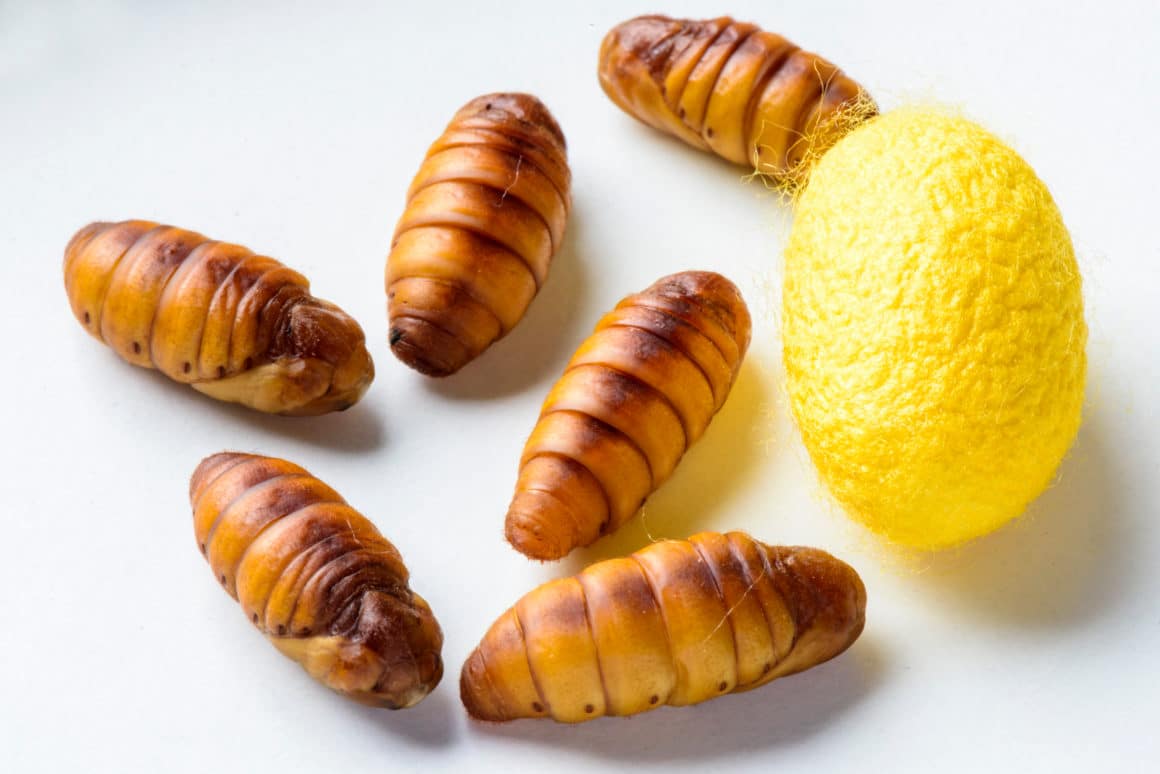Introduction
In nutrition and dietary supplements, peptides have gained significant attention for their potential health benefits. Peptides are short chains of amino acids that can influence various physiological processes, from immune function to tissue repair. Among the myriad of peptides available, silkworm pupa protein peptides and abalone peptides have emerged as notable contenders due to their unique sources and distinct biochemical profiles. This article delves into a comprehensive comparison between silkworm pupa protein peptides and abalone peptides, exploring their sources, nutritional benefits, mechanisms of action, and potential applications.
Silkworm Pupa Protein Peptide: Origin and Composition
Silkworms, specifically the Bombyx mori species, are well-known for their role in silk production. However, their pupae, the larval stage between the caterpillar and adult moth, have long been used in traditional medicine and as a food source in many Asian cultures. The protein derived from silkworm pupae has been identified as a rich source of bioactive peptides.
1. Nutritional Profile
Silkworm pupa protein peptides are derived from the proteins in silkworm pupae, which are high in essential amino acids, including lysine, leucine, and valine. These peptides are known for their high digestibility and bioavailability. They also contain significant vitamins and minerals, such as B vitamins, iron, and calcium.
2. Bioactive Peptides
Silkworm pupa proteins are processed to release smaller peptide fragments through enzymatic hydrolysis. These peptides have been shown to exhibit various biological activities, including antioxidant, antihypertensive, and antimicrobial properties. For example, silkworm pupa peptides have demonstrated the ability to scavenge free radicals and reduce oxidative stress, which can be beneficial in preventing chronic diseases.
Abalone Peptide: Origin and Composition
Abalone, a type of marine mollusk, is highly prized in culinary traditions, particularly in East Asia. Abalone peptides are derived from the proteins found in abalone meat through hydrolysis. These peptides are gaining attention for their potential health benefits and unique properties.
1. Nutritional Profile
Abalone peptides are derived from abalone flesh and are rich in high-quality proteins and essential amino acids. Abalone meat also contains various micronutrients, including vitamin B12, iron, and zinc. The protein content in abalone is particularly noted for its high bioavailability and digestibility.
2. Bioactive Peptides
Similar to silkworm pupa peptides, abalone peptides are released through enzymatic hydrolysis. These peptides have been found to possess several beneficial properties, such as antioxidant, anti-inflammatory, and immunomodulatory effects. For instance, abalone peptides have been shown to enhance immune response and reduce inflammation, contributing to overall health and well-being.
Comparative Analysis: Silkworm Pupa Peptides vs. Abalone Peptides
1. Source and Sustainability
– Silkworm Pupa Peptides: Silkworms are cultivated for silk production, and the extraction of protein peptides from pupae is a byproduct of the silk industry. This makes silkworm pupa peptides a sustainable practice, utilizing a resource that might otherwise be discarded.
– Abalone Peptides: Abalone farming is more resource-intensive than silkworm farming. While abalone are highly nutritious, their farming can have significant environmental impacts. The sustainability of abalone peptide production depends on the methods used in abalone aquaculture and harvesting practices.
2. Health Benefits
– Silkworm Pupa Peptides: These peptides are noted for their antioxidant and antihypertensive properties. They may be beneficial in managing hypertension and reducing oxidative stress associated with various chronic diseases.
– Abalone Peptides: Abalone peptides are recognized for their anti-inflammatory and immunomodulatory effects. They can support immune function and reduce inflammation, which is beneficial for overall health and managing conditions like arthritis.
3. Digestibility and Bioavailability
Both silkworm pupa peptides and abalone peptides are highly digestible and bioavailable. Their small peptide sizes facilitate easy absorption in the gastrointestinal tract, effectively delivering their health benefits.
4. Potential Applications
– Silkworm Pupa Peptides: These peptides are often incorporated into dietary supplements, functional foods, and skincare products. Their antioxidant properties make them attractive for products that reduce signs of aging and improve skin health.
– Abalone Peptides: Abalone peptides are primarily used in dietary supplements and functional foods. Their potential immune-boosting and anti-inflammatory effects make them suitable for products that support immune health and reduce inflammation.
Scientific Evidence and Research
1. Silkworm Pupa Peptides
Numerous studies have investigated the health benefits of silkworm pupa peptides. Research has demonstrated their potential in reducing blood pressure, enhancing antioxidant defenses, and exhibiting antimicrobial activity. Clinical trials and animal studies support their use in managing hypertension and oxidative stress.
2. Abalone Peptides
Research on abalone peptides has highlighted their role in boosting immune function and reducing inflammation. Studies have shown that these peptides can enhance immune cells’ activity and reduce inflammation markers. Clinical trials are ongoing to elucidate their benefits and optimal dosages further.
Safety and Considerations
1. Silkworm Pupa Peptides
Silkworm pupa peptides are generally considered safe for consumption. However, individuals with shellfish allergies should exercise caution, as there may be cross-reactivity. It is essential to source these peptides from reputable suppliers to avoid contamination with allergens or other harmful substances.
2. Abalone Peptides
Abalone peptides are also considered safe for most people. As with any dietary supplement, it is essential to use them according to recommended dosages and consult with a healthcare provider, especially if there are underlying health conditions or allergies.
Conclusion
Both silkworm pupa protein peptides and abalone peptides offer unique benefits and applications. Silkworm pupa peptides stand out for their antioxidant and antihypertensive properties, making them valuable for managing oxidative stress and hypertension. On the other hand, abalone peptides are notable for their immune-boosting and anti-inflammatory effects, contributing to overall health and immune support.
Considerations such as source sustainability, specific health goals, and personal dietary needs should be considered when choosing between these peptides. Both peptides have shown promise in scientific research and offer valuable health benefits, making them worthwhile additions to nutritional supplements and functional foods.
As research continues to evolve, further insights into these peptides’ specific mechanisms of action and long-term effects will provide a clearer understanding of their roles in health and wellness. Until then, silkworm pupa and abalone peptides remain intriguing options for those seeking to enhance their health through dietary supplementation.

